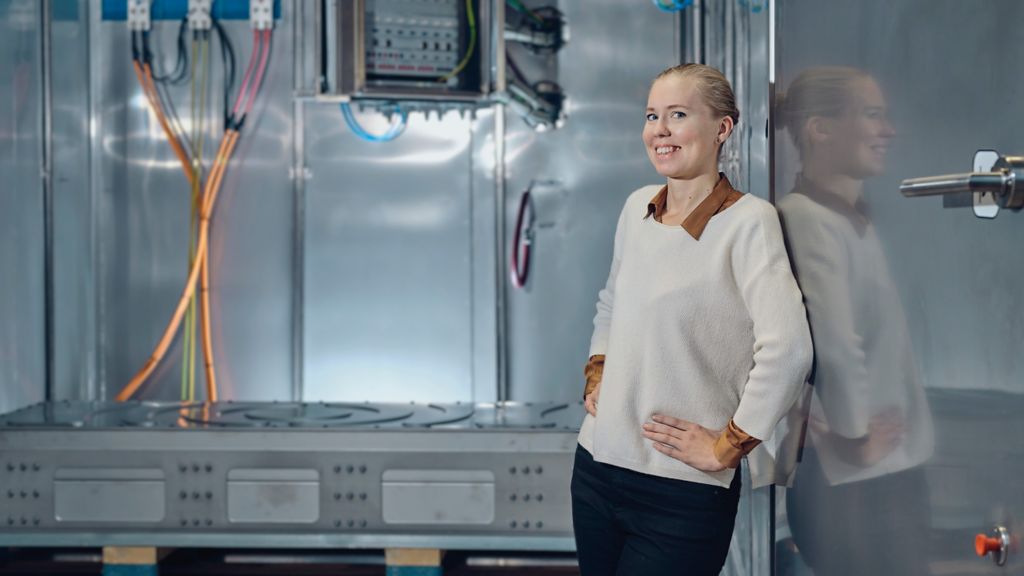Testing batteries to the extreme


One of the biggest hurdles to getting people to switch from diesel engines to clean, sustainable electricity, is the uncertainly of using new, unproven technology. Particularly when it comes to batteries – the most expensive component in any electric driveline.
“Batteries are really sensitive to temperature,” explains Ylva Olofsson, Project Manager, Laboratory Development Battery Testing, Volvo Group. “They need to maintain a stable temperature internally, despite the climate conditions outside. So, it’s really important that we test our batteries vigorously and put a lot of pressure on them. We need to be confident that they will meet our customers’ expectations – no matter where in the world they operate.”
Until very recently, testing involved physically driving vehicles in different locations with extreme conditions, such as far north Sweden in winter or southern Spain in summer. But now, Volvo Group has invested in its own climate battery laboratory at its headquarters in Gothenburg, Sweden. This makes it possible to test batteries in conditions as low as -40°C to as high as 70°C, all within the confines of one centrally located state-of-the-art facility.
“Being able to do the testing in-house like this is so much quicker and convenient,” says Ylva Olofsson. “Our programmers can write the code, make medications on the vehicle and test it immediately. We’ve closed the testing loop significantly, as well as reduced the planning and logistics required, and reduced our dependency on third-parry suppliers. This also gives us far greater confidence in the quality of test results.”
The climate lab is located at the Volvo Group’s CampX, a collaborative space that brings together the company’s expertise within electromobility, automation and connectivity, as well as customers, start-ups, suppliers, academia and government authorities.
The Volvo Group plans to continue investing heavily in its in-house electromobility testing and development capabilities. By bringing together all of its expertise and resources to one location, the Volvo Group will significantly reduce lead times and improve the quality of test results.
“It feels great to come here every day and work closely with so many motivated people, it creates this sense of having a common purpose,” says Ylva Olofsson. “A lot of exciting things are happening at this very spot.”
Working with battery testing is far removed from Ylva Olofssons’s original aspiration, which was to join an orchestra. She has long been passionate about music, art and languages, but was ultimately attracted to engineering and the opportunity to enact social change. She did her Masters’ thesis on the lifecycles of lithium-ion batteries and their impact on sustainability. When she joined the Volvo Group in 2013, she worked with the second life and lifecycle management of batteries.
“When I first started here, I thought the company’s ambitions were never going to happen,” admits Ylva Olofsson. “But I’ve been surprised by how quickly things are moving. Volvo is really investing in its testing capabilities, like our climate lab, and the range of competences here is immense. We need electromobility to help solve the climate crisis and this is a place where we can do it.”
Facts Ylva Olofsson
Name: Ylva Olofsson
Title: Project Manager, Laboratory Development Battery Testing, Volvo Group
Age: 33
Background: MSc in Mechanical Engineering (Master’s programme in Sustainable Energy Systems) from Chalmers University of Technology, Gothenburg, Sweden. Started at the Volvo Group in 2013 as a research Engineer at Electromobility Sub-Systems. Later roles include laboratory manager and project manager within Propulsion Technology, and project manager for Viva energy systems within Volvo Buses. Project manager within Electromobility since 2018.
Years at Volvo Group: 8 years
What drives you: “As an engineer, it’s very positive knowing that you’re contributing to meaningful change. That what you’re developing will have a lasting impact for many years to come.”
Learn more about Engineering and Technology jobs at Volvo Group here